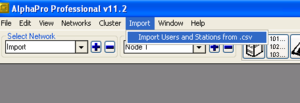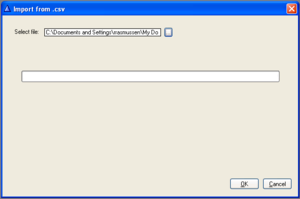Difference between revisions of "Import Users and Stations from .csv file"
From Zenitel Wiki
| Line 7: | Line 7: | ||
*The .csv data is imported into the currently selected Node. '''NOTE:''' All groups are 'emptied' before the Import function starts. | *The .csv data is imported into the currently selected Node. '''NOTE:''' All groups are 'emptied' before the Import function starts. | ||
| + | |||
| + | ==File format from AlphaPro version 11.6.3.4 == | ||
| + | |||
| + | :Import from .csv: Added more options to the Import from .csv function. The new format is: | ||
| + | ::<directory number>;<id number>;<groups>;<group access level>;<cos>;<display text>;<udp groups>;<exp parameter>; | ||
| + | :where | ||
| + | ::<groups> can now contain a list of groups separated by comma: ''..;1,2,30;..'' | ||
| + | ::<udp groups> can contain a list of udp groups separated by comma: ''..;1,8;..'' | ||
| + | :: | ||
| + | ::<dak> is a list of DAK key strings separated by comma: ''..;1:I60,2:I640;..'' | ||
| + | ::::Each DAK key string is prefixed by DAK key number, so that the example above will result in the DAK key string ''I60'' being programmed to DAK key 1 and ''I640'' being programmed to DAK key 2. To delete existing DAK keys, use ''..;9:,10:;..''. Here DAK keys 9 and 10 will be deleted. | ||
| + | ::<station type> indicates station type, where | ||
| + | ::* 0 (or missing) = Master Station | ||
| + | ::* 1 = Sub Station | ||
| + | ::* 2 = PNCI | ||
| + | ::* 3 = CRM | ||
| + | ::* 4 = Display Station | ||
| + | ::* 5 = Dual Display | ||
| + | ::* 6 = Custom 2 | ||
| + | |||
| + | If the <global> field is 1, the <directory number> will be added as a feature 83 number with the <id number> as node number. If the <global> field is 0 (or empty), the <directory number> will be added as a feature 9 number with the <id number> as physical number. If a global number is added, only <directory number>, <id number> and <display text> are used. All other fields are ignored. | ||
| + | |||
| + | If the <ccoip> field is 1, the station with physical number = <id number> will be set to be an CCoIP station. If the field is 0 (or empty) the station will keep the CCoIP setting it had before the import process. | ||
==File format from AlphaPro version 11.5.3.0 == | ==File format from AlphaPro version 11.5.3.0 == | ||
Revision as of 11:51, 4 February 2014
As from AlphaPro version 11.2.3.4 a feature for importing data from a .csv file was added. The function was extended with more fields in version 11.5.3.0.
The Import function is available from the Main Menu in AlphaPro.
- The .csv file must use ";" (semicolon) as field delimiter. The first line in the file must have data, do not use it for header information (list of field names)
- The .csv data is imported into the currently selected Node. NOTE: All groups are 'emptied' before the Import function starts.
File format from AlphaPro version 11.6.3.4
- Import from .csv: Added more options to the Import from .csv function. The new format is:
- <directory number>;<id number>;<groups>;<group access level>;<cos>;<display text>;<udp groups>;<exp parameter>;
;<mail in idle>;<global>;<ccoip>;<dak>;<station type>
- <directory number>;<id number>;<groups>;<group access level>;<cos>;<display text>;<udp groups>;<exp parameter>;
- where
- <groups> can now contain a list of groups separated by comma: ..;1,2,30;..
- <udp groups> can contain a list of udp groups separated by comma: ..;1,8;..
, <mail in idle>, <global> and <ccoip> is either 0 or 1 for respectively unchecked and checked - <dak> is a list of DAK key strings separated by comma: ..;1:I60,2:I640;..
- Each DAK key string is prefixed by DAK key number, so that the example above will result in the DAK key string I60 being programmed to DAK key 1 and I640 being programmed to DAK key 2. To delete existing DAK keys, use ..;9:,10:;... Here DAK keys 9 and 10 will be deleted.
- <station type> indicates station type, where
- 0 (or missing) = Master Station
- 1 = Sub Station
- 2 = PNCI
- 3 = CRM
- 4 = Display Station
- 5 = Dual Display
- 6 = Custom 2
If the <global> field is 1, the <directory number> will be added as a feature 83 number with the <id number> as node number. If the <global> field is 0 (or empty), the <directory number> will be added as a feature 9 number with the <id number> as physical number. If a global number is added, only <directory number>, <id number> and <display text> are used. All other fields are ignored.
If the <ccoip> field is 1, the station with physical number = <id number> will be set to be an CCoIP station. If the field is 0 (or empty) the station will keep the CCoIP setting it had before the import process.
File format from AlphaPro version 11.5.3.0
<directory number>;<id number>;<groups>;<group access level>;<cos>;<display text>;<udp groups>;<exp parameter>;;<mail in idle>;<global>;<ccoip>
Where:
- <groups> can now contain a list of groups separated by comma: ..;1,2,30;..
- <group access level> can have these values: 0=Low, 1=Medium, 2=High
- <udp groups> can contain a list of udp groups separated by comma: ..;1,8;..
- <always private>, <mail in idle>, <global> and <ccoip> is either 0 or 1 for respectively unchecked and checked
If the <global> field is 1, the <directory number> will be added as a feature 83 number with the <id number> as node number. If the <global> field is 0 (or empty), the <directory number> will be added as a feature 9 number with the <id number> as physical number. If a global number is added, only <directory number>, <id number> and <display text> are used. All other fields are ignored.
If the <ccoip> field is 1, the station with physical number = <id number> will be set to be an CCoIP station. If the field is 0 (or empty) the station will keep the CCoIP setting it had before the import process.
File format in AlphaPro version 11.2.3.4
<directory number>;<physical number>;<group>;<group access level>;<cos>;<display text>
Example:
101;1;1;2;16;TEST-TELEPHONE 102;2;1;2;4;Wheelhouse 103;3;1;2;4;Wheelhouse 104;4;1;0;1;Station 4 .. etc.


